Daily
life in the only men's monastery in Germany,
dedicated to St Job of Pochaev, headed by His Eminence
Archbishop Mark (Arndt) of Germany. Monk Joseph
(Bandmann), an Orthodox German, reports on life in the
monastery he has lived in for nine years.
On the left is a meadow, pond and the white walls of
Blutenburg Castle. On the right are quaint German houses
of Pasing. Between them is the Monastery of St Job of
Pochaev, which adheres to the Mt Athos monastic rule.
The monastery was founded in 1945 by former residents of
Pochaev Monastery in Czechoslovakia, who lived there
during wartime years and decided to move to Allied
territory to escape the Soviets. In its better years, the
monastery had 40 residents, but by 1980, only the retired
Archbishop Nathanael and a reader remained.
Everything changed in 1980, when Bishop Mark (Arndt)
arrived (now Archbishop of Berlin and Germany). Vladyka
had before then made many visits to the monasteries of the
Holy Mountain and Serbia. He and a few other enthusiasts
founded a monastic community following the Athos rule. In
the Monastery of St Job of Pochaev, Vladyka Mark also
established the same practices of the Holy Mountain of
Athos. But the spirit of Pochaev lives on, both in the
obediences, the priority of publishing work, and also in
singing.
The monastery now houses ten residents,
all of whom were received by Vladyka Mark, its abbot.
Photo: The brethren during a trip to Walchensee, an
alpine lake not far from Munich.
Archbishop Mark lives in the monastery,
where his office is. He regularly takes the monks'
confessions and rises every day with them all; daily
services begin at 4 am. He also serves in the
cathedral, visits parishes scattered throughout all of
Germany, and makes regular visits to Great Britain and
the Holy Land, and recently participated in a session
of the Holy Synod in Moscow.
Vladyka prefers to serve as a priest in
the monastery. He would even wear the phelon and minor
omophorion.
On holidays he serves as a hierarch.
Church is the center of monastic life.
Divine services are strictly performed. The church is
usually bathed in twilight, electric light is only
turned on in the altar, the rest of the church has
candlelight.
According to tradition, before the first
daily service and after the end of the last service of
the day, all the monastics and pilgrims venerate every
icon in the church and ask the blessing of Vladyka and
forgiveness from each other. Archbishop Mark's
place is the "stasidia" at the iconostasis
before an icon of St Job.
Great Friday. The Shroud of Christ.
Confession is usually made before the
left side of the altar, on the kliros. The Gospel book
has of an unusual white cover, which has a joyous look
on the analogion.
A fresco of St Job. In the darkness,
during the midnight office, the holy father looks
severe, but in the light of Liturgy one can see his
benevolence.
Litiyas are served outside, before the
narthex.
Bishop Agapit of Stuttgart, Vicar of
Archbishop Mark, who lives at the monastery. Even
before the monks moved to Munich, he came as alayman to
the community of Hieromonk Mark in Wiesbaden, where he
had a striving for the Athonite way of life. He was
present at the resurrection of the Munich monastery and
the publication of the Orthodox calendar and Vestnik,
which actually began in Wiesbaden; Hieromonk Mark typed
the calendar, which was later developed by Novice
Alexander (Gorachek), who later became Bishop Agapit.
Hegumen Evfimy (Logvinov) was as a
layman a restorer in the Grabar Studios, which is now
once again Marfo-Mariinsky Convent, which is closely
tied to Holy New Martyr Grand Duchess Elizaveta
Feodorovna. He came to Munich, became a novice, then
hieromonk, and now serves at the monastery every day.
For twenty years he has maintained correspondence with
believers in Russia, represents the monastery at
conferences in Russia, where he is often a lecturer.
The administrative offices are located
along the main hallway. From here you can enter the
church (at the end of the hallway), and a staircase
leads to the monastic residential cells on the second
floor.
Vladyka Mark's office at the
Monastery of St Job. On the wall are photos of the
First Hierarchs of the Russian Church Abroad. Under
them are miniatures depicting scenes from the life of
St Mark the Ascetic, Vladyka's heavenly
intercessor. Also on the wall are poems written to
Vladyka Mark by children parishioners.
Monk Joseph has been at the monastery
for 9 years. He has many obediences: he leads the
choir, teaches at the Cathedral school, and drives the
car. He loves photography, and chronicles the life of
the monastery.
Publishing is a Pochaev tradition. The
original Pochaev monastery printed a great deal of
Orthodox literature, which was crucial for Western
Ukraine, which had long been under the yoke of the Unia
with the Roman Catholic Church. Fr Joseph also
publishes German-language material.
Monk Philaret (Labi) grew up in France.
He has been at the monastery for over twenty years. He
is a strict monastic with a twist of French humor. His
obedience is to publish books in Russian. He took over
the publishing task from Vladyka Agapit. He had led the
monastic choir for many years, a task he handed over to
Fr Joseph.
The choral style is very monastic--quiet
and lyrical, without noise and added effects,
reminiscent of the style of Pochaev Lavra.
Fr Joseph even takes photos on the kliros. Photo: Novice
Seraphim reads the hours.
Every year in Munich, a church festival
is held on the Sunday of the Triumph of Orthodoxy. A
different church hosts it every year. This year it was
held at Munich's Church of All Holy Patriarchs of
Constantinople; next year the Russian Orthodox Church
will host it. Photos from left: Monk Philimon, the
monastery's baritone and teacher of the Law of God
in the Cathedral school, who also has many other duties
at the monastery.
Monk Amphilohije in the monastery
garden. Germany has a great many landscapes worthy of
the brush of the Russian painted Nesterov.
The monastery's apiary.
Hierodeacon Kornily tending the bees...
… and intoning a litany.
Monk Meliton is responsible for the
monastery's incense. He loves experimenting with
aromas, so his studio is filled with various oils,
fragrances and herbs.
Novice Johann is likely the first
monastic visitors see at services. He tends to the
candles; no easy task: daily services begin at 4 am.
Novice Alexander.
Novice Vitaly, an acolyte.
In the refectory. There are two meals at
the monastery every day, but during lent, only one, but
they do have tea. The cuisine is delicious, with great
variety of dishes. By Vladyka's blessing, for
monastics and guests who are late, portions are set
aside.
The monastery cat--black, of course.
Sitting on the wall, he turns away from this world.
The Russian-style cupolas are not
uncommon in Bavaria. This church also has "onion
domes" on the bell tower.
Russian monks look positively exotic to
Bavarians.
Fr Joseph greets a pilgrim.
nsad.ru
Translation by Synod.com
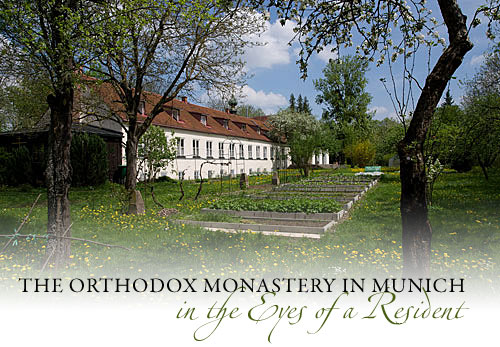
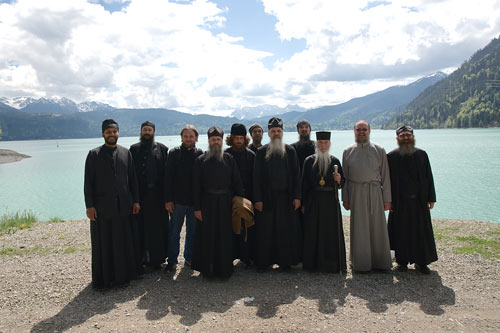
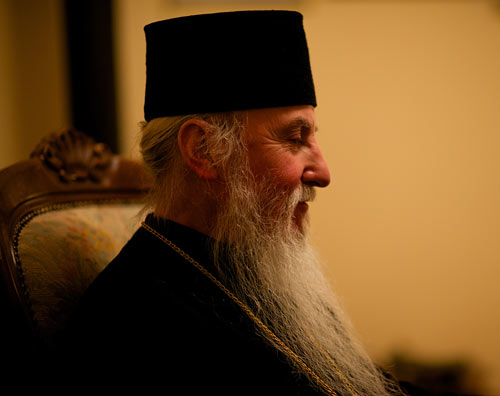
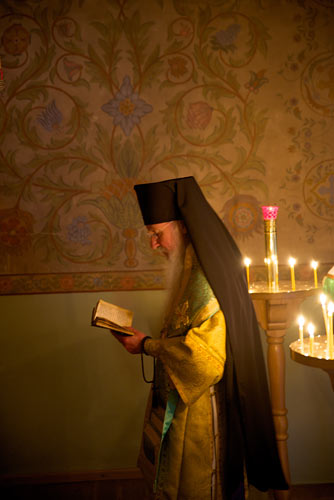
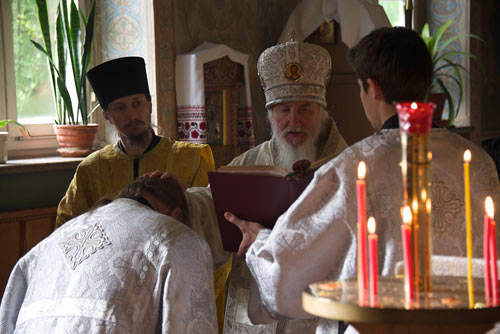
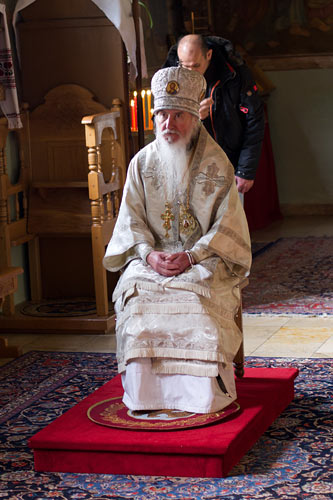
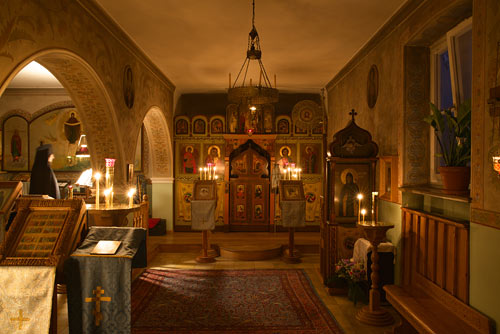
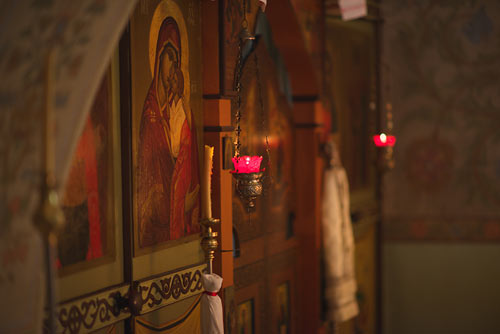
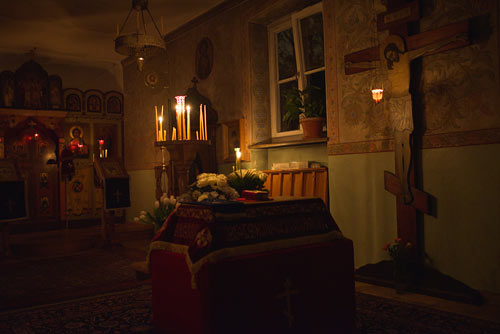
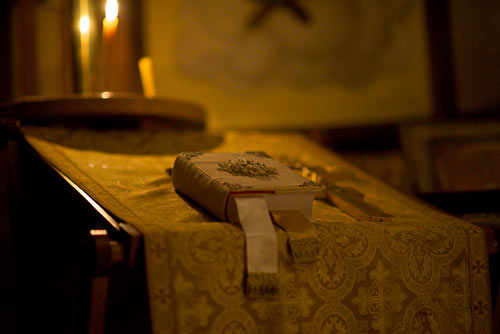
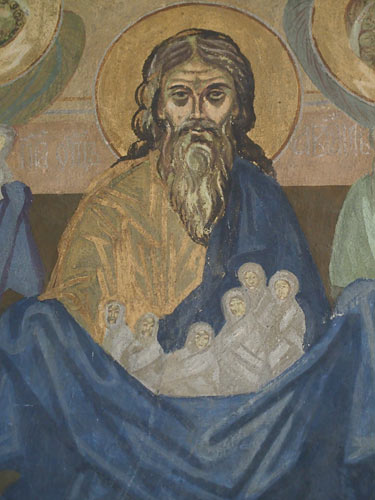
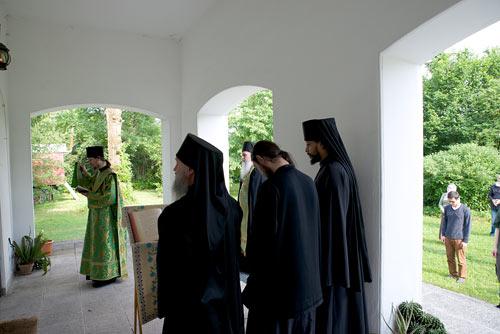
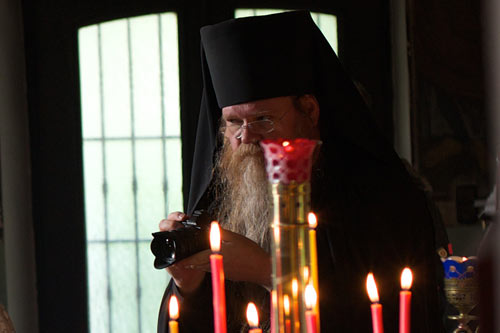
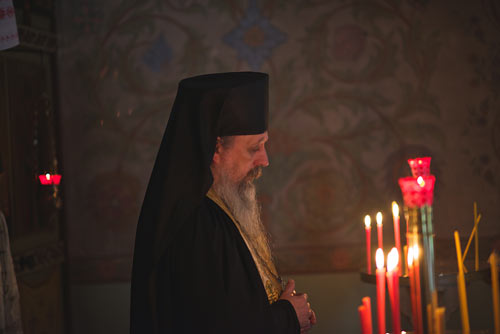
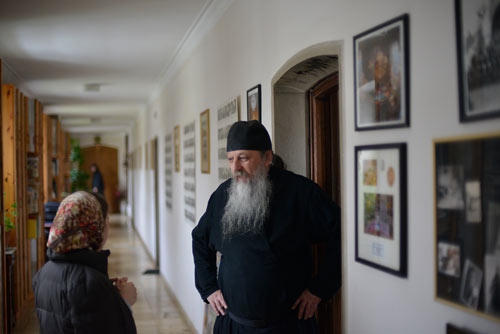
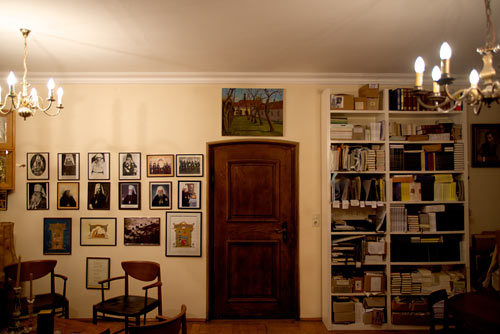
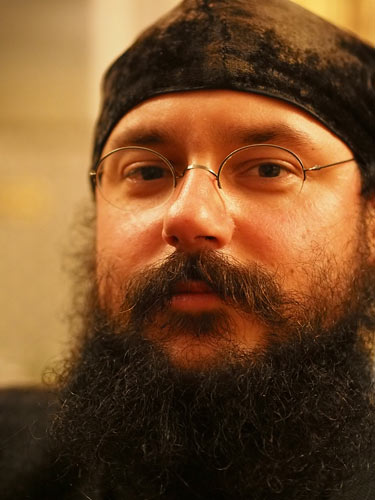
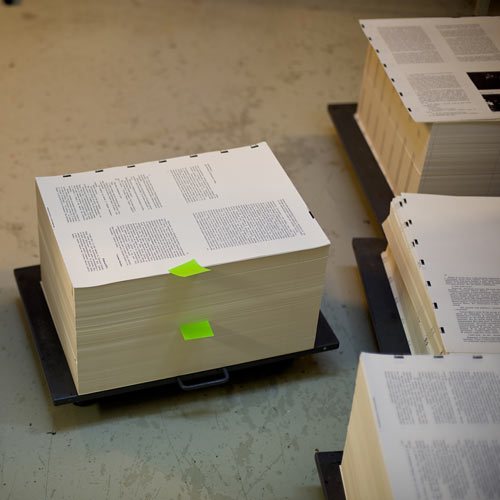
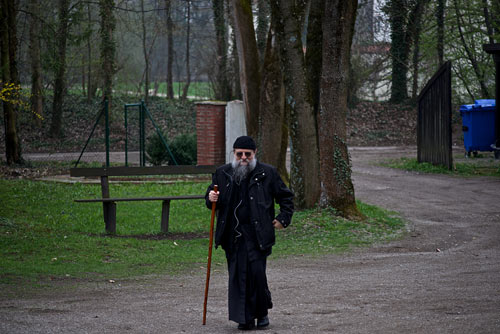
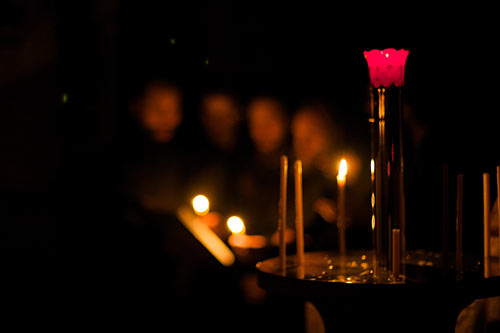
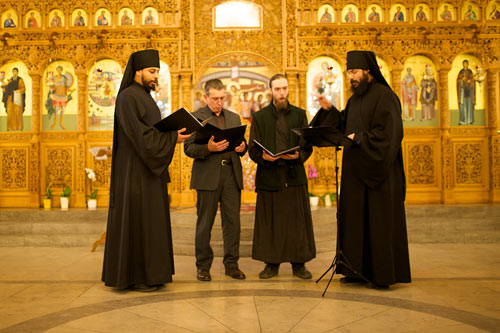
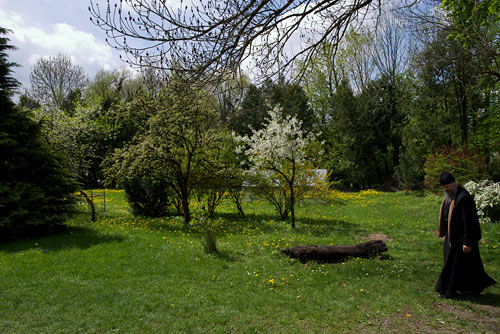
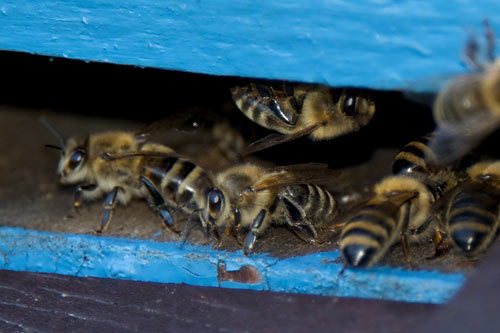
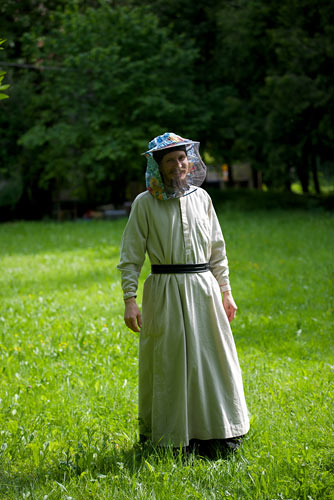
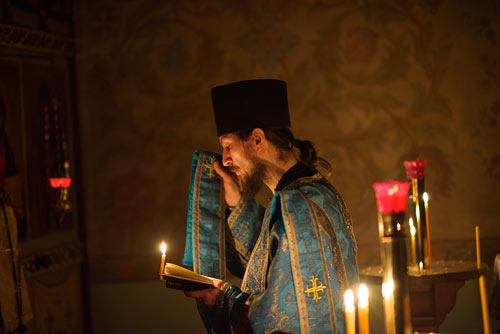
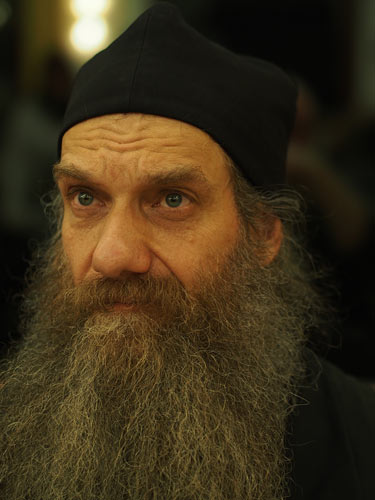
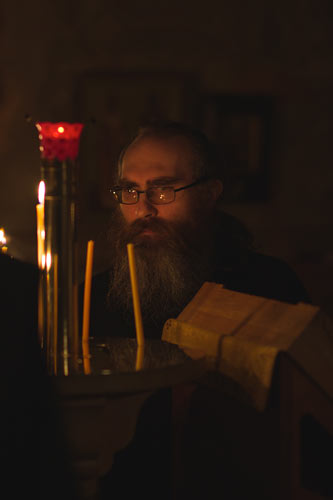
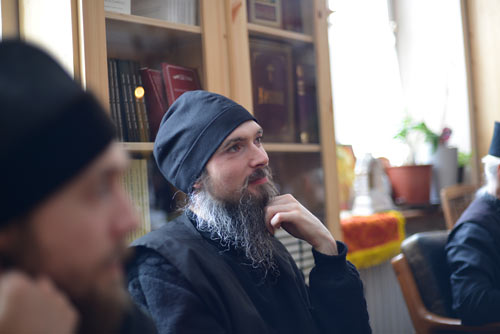
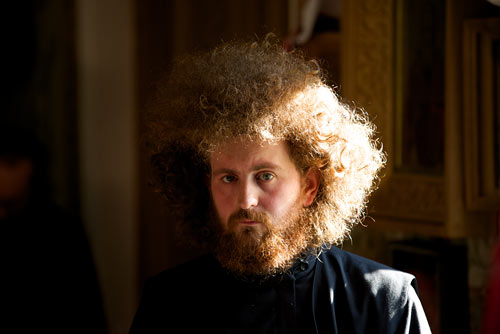
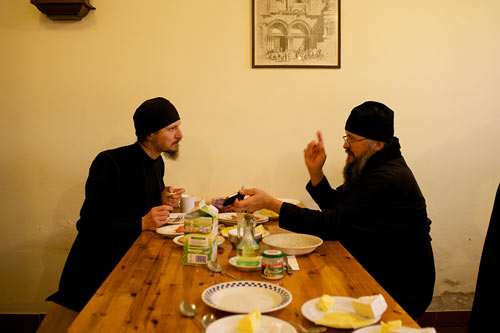
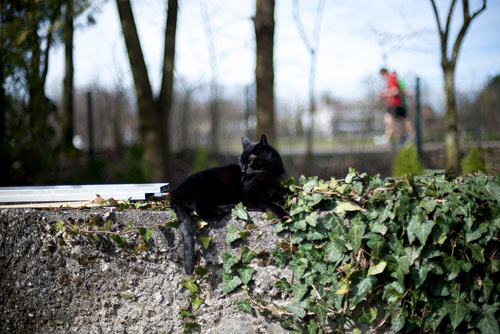
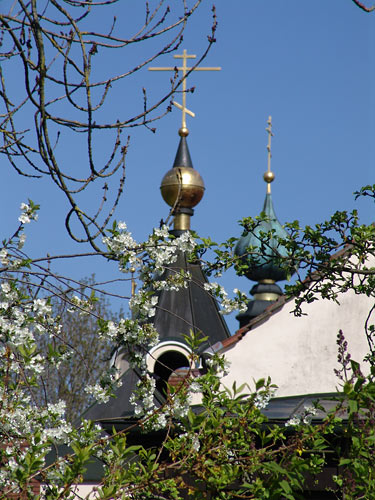
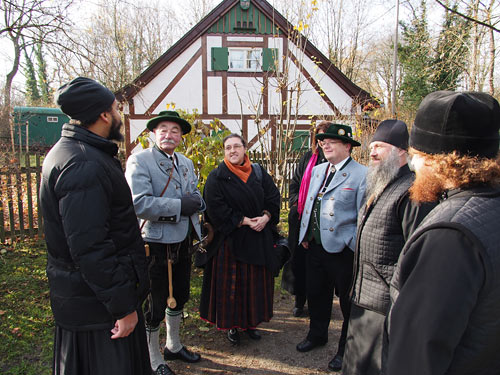
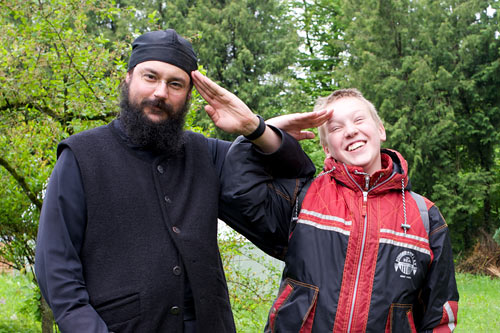

iwant eneyjop in church
iam crystian
ihope can helpe me
My 22 year old daughter and I would like to visit the monastery in Munich this summer and kindly request your email address to continue communication.
In Christ,
Thank you
Seraphim
Une toute nouvelle expйrience! Jeune artiste allemand, j'йtais intйressй а la peinture d'icфnes et j'ai fini par entrer dans l'orthodoxie. Que ce monastиre soit redevenu un lieu aussi vivant me fait trиs plaisir!
Andreas Wolfram AICHELE
In the meantime, I send a nizkiy poklon to all of its residents, the monks that pray for us all.
Reader Nikolai
Washington, DC.